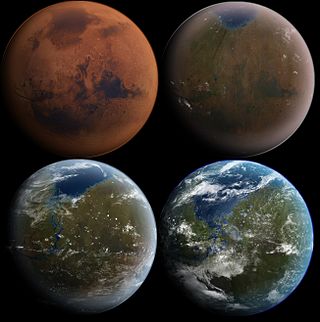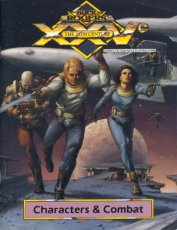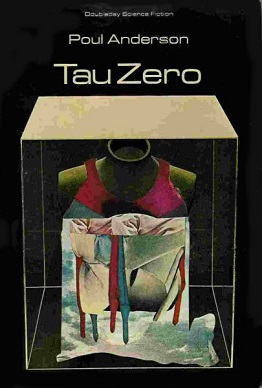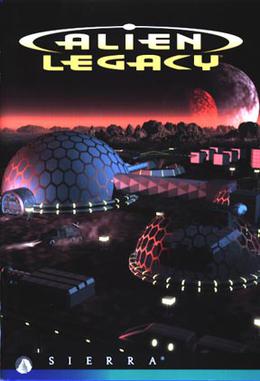
Sid Meier's Alpha Centauri is a 4X video game, considered a spiritual sequel to the Civilization series. Set in a science fiction depiction of the 22nd century, the game begins as seven competing ideological factions land on the planet Chiron ("Planet") in the Alpha Centauri star system. As the game progresses, Planet's growing sentience becomes a formidable obstacle to the human colonists.

Terraforming or terraformation ("Earth-shaping") is the hypothetical process of deliberately modifying the atmosphere, temperature, surface topography or ecology of a planet, moon, or other body to be similar to the environment of Earth to make it habitable for humans to live on.

The Marathon Trilogy is a science fiction first-person shooter video game series from Bungie, originally released for the Classic Mac OS. The name of the series is derived from the giant interstellar colony ship that provides the main setting for the first game; the ship is constructed out of the Martian moon Deimos. The series is often regarded as a spiritual predecessor of Bungie's Halo series.

Master of Orion is a turn-based, 4X science fiction strategy game in which the player leads one of ten races to dominate the galaxy through a combination of diplomacy and conquest while developing technology, exploring and colonizing star systems.
The concept of self-replicating spacecraft, as envisioned by mathematician John von Neumann, has been described by futurists and has been discussed across a wide breadth of hard science fiction novels and stories. Self-replicating probes are sometimes referred to as von Neumann probes. Self-replicating spacecraft would in some ways either mimic or echo the features of living organisms or viruses.
Battlefleet Gothic is a naval miniature wargame that was produced by Games Workshop from 1999 to 2013 with Andy Chambers as the primary developer. A spin-off of the science-fantasy setting of Warhammer 40,000, the game has players command fleets of large spaceships belonging to one of several spaceborne factions. Although the wargame's miniatures and rulebooks are no longer supported by Games Workshop, two video game adaptations have been made since its cancellation in 2013.

Buck Rogers XXVC is a game setting created by TSR, Inc. in the late 1980s. Products based on this setting include novels, graphic novels, a role-playing game (RPG), board game, and video games. The setting was active from 1988 until 1995.

Outpost 2: Divided Destiny is a real-time strategy computer game developed by Dynamix, released in 1997 by Sierra Entertainment. It reuses and refines some of the concepts from the original Outpost, but there is no direct continuity between the storylines or the gameplay.

Millennium 2.2 is a resource management computer game by Ian Bird, released in 1989 for Atari ST, Amiga and MS-DOS. The MS-DOS version of the game was released as Millennium: Return to Earth. It is the forerunner to Bird's Deuteros, which is in a similar resource management game but many times larger and more difficult.

The colonization of Venus has been a subject of many works of science fiction since before the dawn of spaceflight, and is still discussed from both a fictional and a scientific standpoint. However, with the discovery of Venus's extremely hostile surface environment, attention has largely shifted towards the colonization of the Moon and Mars instead, with proposals for Venus focused on habitats floating in the upper-middle atmosphere and on terraforming.
Edgeworks Entertainment is a machinima and new media production company founded by Alexander Winn and cofounded by Lacey Hannan. The company first gained recognition for their machinima series including The Codex Series, Vox Populi, Forsaken and Radical. Edgeworks is also known for hit terraforming game TerraGenesis, which has over 20 million downloads.

Tau Zero is a hard science fiction novel by American writer Poul Anderson. The novel was based upon the short story "To Outlive Eternity" appearing in Galaxy Science Fiction in 1967. It was first published in book form in 1970. The book is a quintessential example of "hard sci-fi", as its plot is dominated by futuristic technology grounded in real physics principles. It was nominated for the Hugo Award for Best Novel in 1971.
The Alliance–Union universe is a fictional universe created by American writer C. J. Cherryh. It is the setting for a future history series extending from the 21st century into the far future.

Alien Legacy is a sci-fi strategy game developed by Ybarra Productions and published by Sierra On-Line in 1994 for MS-DOS.

Starbound is an action-adventure video game developed and published by Chucklefish. Starbound takes place in a two-dimensional, procedurally generated universe which the player is able to explore in order to obtain new weapons, armor, and items, and to visit towns and villages inhabited by various intelligent lifeforms. Starbound was released out of early access in July 2016 for Windows, OS X, and Linux, and for Windows via Xbox Game Pass in December 2020.

PULSAR: Lost Colony is a science fiction space exploration video game being developed by independent developers Leafy Games, LLC. The video game was greenlit on Steam Greenlight on October 3, 2013, and was later funded successfully on Kickstarter on October 31, 2013. The game was released in an Alpha state on February 25, 2014, and was later available on Steam's Early Access program following an official release on June 23, 2021.

Aurora is a 2015 novel by American science fiction author Kim Stanley Robinson. The novel concerns a generation ship built in the style of a Stanford torus traveling to Tau Ceti in order to begin a human colony. The novel's primary narrating voice is the starship's artificial intelligence. The novel was well received by critics.

Surviving Mars is a city building survival video game initially developed by the Bulgarian studio Haemimont Games, and later by Abstraction Games, and published by Paradox Interactive. It was released on Microsoft Windows, macOS, Linux, PlayStation 4 and Xbox One on March 15, 2018. The player serves as an overseer who must build a colony on Mars and ensure the survival of the colonists. A spiritual successor, Surviving the Aftermath, was released in 2021.












